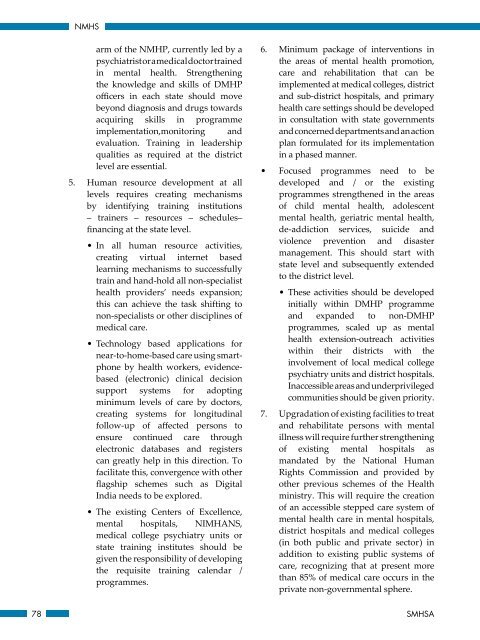National Mental Health Survey of India 2015-16
NMHS%20Report%20%28Mental%20Health%20Systems%29%201
NMHS%20Report%20%28Mental%20Health%20Systems%29%201
You also want an ePaper? Increase the reach of your titles
YUMPU automatically turns print PDFs into web optimized ePapers that Google loves.
NMHS<br />
arm <strong>of</strong> the NMHP, currently led by a<br />
psychiatrist or a medical doctor trained<br />
in mental health. Strengthening<br />
the knowledge and skills <strong>of</strong> DMHP<br />
<strong>of</strong>ficers in each state should move<br />
beyond diagnosis and drugs towards<br />
acquiring skills in programme<br />
implementation,monitoring and<br />
evaluation. Training in leadership<br />
qualities as required at the district<br />
level are essential.<br />
5. Human resource development at all<br />
levels requires creating mechanisms<br />
by identifying training institutions<br />
– trainers – resources – schedules–<br />
financing at the state level.<br />
• In all human resource activities,<br />
creating virtual internet based<br />
learning mechanisms to successfully<br />
train and hand-hold all non-specialist<br />
health providers’ needs expansion;<br />
this can achieve the task shifting to<br />
non-specialists or other disciplines <strong>of</strong><br />
medical care.<br />
• Technology based applications for<br />
near-to-home-based care using smartphone<br />
by health workers, evidencebased<br />
(electronic) clinical decision<br />
support systems for adopting<br />
minimum levels <strong>of</strong> care by doctors,<br />
creating systems for longitudinal<br />
follow-up <strong>of</strong> affected persons to<br />
ensure continued care through<br />
electronic databases and registers<br />
can greatly help in this direction. To<br />
facilitate this, convergence with other<br />
flagship schemes such as Digital<br />
<strong>India</strong> needs to be explored.<br />
• The existing Centers <strong>of</strong> Excellence,<br />
mental hospitals, NIMHANS,<br />
medical college psychiatry units or<br />
state training institutes should be<br />
given the responsibility <strong>of</strong> developing<br />
the requisite training calendar /<br />
programmes.<br />
6. Minimum package <strong>of</strong> interventions in<br />
the areas <strong>of</strong> mental health promotion,<br />
care and rehabilitation that can be<br />
implemented at medical colleges, district<br />
and sub-district hospitals, and primary<br />
health care settings should be developed<br />
in consultation with state governments<br />
and concerned departments and an action<br />
plan formulated for its implementation<br />
in a phased manner.<br />
• Focused programmes need to be<br />
developed and / or the existing<br />
programmes strengthened in the areas<br />
<strong>of</strong> child mental health, adolescent<br />
mental health, geriatric mental health,<br />
de-addiction services, suicide and<br />
violence prevention and disaster<br />
management. This should start with<br />
state level and subsequently extended<br />
to the district level.<br />
• These activities should be developed<br />
initially within DMHP programme<br />
and expanded to non-DMHP<br />
programmes, scaled up as mental<br />
health extension-outreach activities<br />
within their districts with the<br />
involvement <strong>of</strong> local medical college<br />
psychiatry units and district hospitals.<br />
Inaccessible areas and underprivileged<br />
communities should be given priority.<br />
7. Upgradation <strong>of</strong> existing facilities to treat<br />
and rehabilitate persons with mental<br />
illness will require further strengthening<br />
<strong>of</strong> existing mental hospitals as<br />
mandated by the <strong>National</strong> Human<br />
Rights Commission and provided by<br />
other previous schemes <strong>of</strong> the <strong>Health</strong><br />
ministry. This will require the creation<br />
<strong>of</strong> an accessible stepped care system <strong>of</strong><br />
mental health care in mental hospitals,<br />
district hospitals and medical colleges<br />
(in both public and private sector) in<br />
addition to existing public systems <strong>of</strong><br />
care, recognizing that at present more<br />
than 85% <strong>of</strong> medical care occurs in the<br />
private non-governmental sphere.<br />
78<br />
SMHSA


